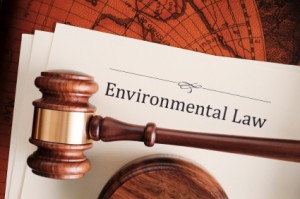In this blog post, Sunidhi, a student of the Rajiv Gandhi National University of Law, Patiala has suggested few improvements in Environmental Law of India. The blog post highlights how laws of another country can help in improving Indian environmental laws.
Introduction
The destruction of the environment, as it has been elsewhere, is quite apparent in India, too. Environmental pollution is a major challenge to the civilized law. Law, as the means of social control, was unknown in ancient India; but environmental consciousness was not absent in the people. Every individual in the society observed dharma as a part of life, which taught them to worship nature.
Classical texts like Manu Samhita, Brihat Parasar Samhita, Brihaspati Samhita, etc., prescribed punishments for offenders for destroying trees, animals or for polluting water.[1] Medieval people lost sight of the need for the preservation of the environment. However towards the end of 19th century, under the supervision of colonial masters, India passed some legislations which indirectly contributed towards the preservation of the environment. Presently, in India, more or less, 200 legislations deal directly or indirectly with environment pollution and degradation. But the environment is continuously degrading despite these laws, as there are many loopholes in it.
Suggestions
Prudent environment management is the need of the hour. A few suggestions relating to planning and for improvement of legal as well as enforcement mechanism may be given here which if operationalized may prove relevant and viable to lessen the pollution problems.
The comprehensive preservation, protection, and development of the environment in India may be vested upon three agencies, namely National Environment Commission, Central & State Pollution Control Board and Environmental Court. The commission will be responsible for developing the environmental policy, advising Ministry of Environment and Forests about appropriate changes in law, framing rules and regulation under the present legislations after undertaking continuous research. Boards will act as the monitoring, investigating and enforcing agencies. Special Courts may be set up at regional levels; wherein judges will be assisted by experts. At the central government level, the MoEF will co-ordinate the three agencies, without interfering in their independence and facilitating in financial and administrative matters.[2]
The legislature, based on the German Environmental Code[3], should frame one consolidated environmental code, instead of enacting various laws dealing with diverse environmental aspects. It would prevent the overlapping of provisions. The code should enumerate constitution, powers, and functions of all the agencies, so, that functional and jurisdictional overlapping can be avoided. People from different fields of knowledge, who are directly or indirectly involved with the environment should be appointed instead of political and preferential appointment.
It is necessary to enhance the quantum of fines so that it has a deterrent effect on the large corporate bodies. It is equally essential that the code should direct transnational corporations to follow same standards of safety which are expected to be observed in the host country. Whenever a corporation commits any environmental crime, its officials must be held liable, and care should be taken that the innocent should not be punished. This would have the effect of increasing the responsibility of the management.
Environment Impact Assessment is still in its nascent stages. A separate legislation may be enacted on the lines of the U.S. National Environmental Policy Act of 1969, which could provide EIA a statutory requirement for all polluting activities or proposed development plans. The entire process should not be done in a state of secrecy but be amenable to public scrutiny and review by judicial bodies. EIA needs to be institutionalized and standardized and public participation by involving NGOs be made mandatory so as to ensure administratively and public acceptability of anticipatory activities in the project.
To make environmental auditing more meaningful, it is necessary that it should be backed up by some suitable legislation. The Companies Act may be amended suitably providing for compulsory inclusion of a statement on the environment in the annual reports of the companies. The industry should be properly educated regarding the usefulness of auditing in reducing manufacturing costs by organizing orientation programs.
Economic steps could be a useful instrument of preventive environmental policy if used in the right framework. Economic Instruments may be applied for the compliance of standards as well as an incentive to promote adoption of environmentally benign alternatives or technologies. In other words, taxes in proportion to emission loads or proportion to the excess profit made through non-observance of laws may be imposed. The polluter could react to such taxing with a mix consisting of tax avoidance through reduction of emissions, substitution of inputs or production processes, etc. An environmental fund may be set up. It would include contributions of government, mega corporations, environmental and the general people of the country. In the case of environmental disasters, it would facilitate immediate payment to victims to avoid long-term effects of trauma.
A better approach for deriving standards will be to carry out a trade-off between the cost of pollution control and the concomitant cost of environmental damage. The combination of the two results in a minimum net cost which identifies the optimum degree of control. This approach will be economically efficient and will take into consideration available technology. It will be flexible at the same time as technology will improve, the cost function will always lead to new and better standards. It will incorporate primary consideration of health which is implicit in the evaluation of the damage function.[4]
The existing anti-pollution laws, though effective on paper, suffer from practical difficulties, defeating the legislative object. Hence, changes must be made at appropriate places, taking the clue from the law of other countries. Various organizations and agencies must be encouraged to lend their support towards the setting up of a clean pollution free environment.
‘The earth is the mother, and we are her children…
Human destinies are inseparably linked with that of Earth.
It is, therefore, our duty to maintain the nature of Nature.
It is in our self-interest, if nothing else.’
[divider]
Footnotes:
[1] NK Chakrabarti, Environment Protection and the Law, 1994, p 22.
[2] Indrajit Dube, Environmental Jurisprudence: Polluter’s Liability, 2007, p 156.
[3] German Civil Code is an umbrella legislation which covers almost every aspect of the environment.
[4] Kailash Thakur, Environment Protection Law & Policy in India, 2007, p 416.
 Serato DJ Crack 2025Serato DJ PRO Crack
Serato DJ Crack 2025Serato DJ PRO Crack









 Allow notifications
Allow notifications


